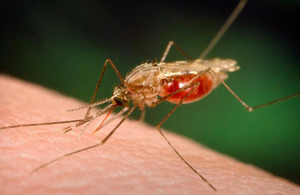Half of UK’s imported malaria cases in London residents
New report highlights the need for raised awareness among London residents about protecting against the disease.

Anopheles mosquito
A new report on the burden of imported malaria in London in 2012 highlights the need for raised awareness among residents about protecting against the disease, particularly when visiting family abroad.
The Public Health England (PHE) malaria reference laboratory reported that 676 London residents were confirmed with the infection in 2012, half of all cases reported for the UK (1,378).
Between 2000 and 2012, 88% of all imported malaria cases in London were acquired in sub-Saharan Africa, and particularly West Africa. Travel to Nigeria in particular accounted for 4,659 cases in London, 45% of all those reported. In the same period, over half of all cases reported their reason for travel as visiting friends or relatives.
The South East London boroughs, and particularly Southwark and Greenwich, bear the largest burden of imported malaria. It is likely that this is because a large number of the residents of these boroughs are of black African ethnicity and so possibly more likely to be visiting friends and family in Africa.
With non-UK born people, there can be a misconception about immunity. People born in a malaria endemic country are likely to have had some immunity to the infection through natural exposure to malaria parasites. However, once no longer living in such a country, and no longer being exposed to the infection, immunity rapidly wanes. Malaria medication is therefore required when visiting malarious countries.
Dr Yvonne Doyle, regional director for PHE in London, said:
Malaria is a preventable disease, so it’s concerning that we continue to see high numbers of cases in London residents who have travelled abroad.
It’s also worrying that the majority of people (80%)* who contracted malaria reported not having taken anti-malarials during travel to areas where the disease is endemic.
Dr Doyle added that confusion about immunity is a major reason why people don’t seek advice prior to travel, particularly when visiting family and friends.
Often people living in the UK who were born in a country affected by malaria may incorrectly believe that they are ‘immune’ to malaria. The reality is that any resistance they may have to the infection decreases rapidly once people come to live in the UK.
It’s therefore important to improve awareness of the disease, including mosquito-avoidance advice, access to and therefore uptake of malaria prophylaxis, particularly for black African ethnic groups where the burden of malaria is greatest.
ENDS
Notes to editors:
- *Where reported, the majority (80%, 5692/7114) had not taken any prophylaxis. Among the remaining case who reported taking some prophylactic treatment, information on the appropriateness of the treatment was not available, nor if the individual had adhered to the recommended regimen.
- In 2012, 676 cases of malaria among London residents were diagnosed by the PHE Malaria Reference Laboratory (MRL). This accounted for half (49%) of the 1378 cases reported for the UK (a UK rate of 2.2 per 100,000). The rate of malaria has continued to decrease from a peak of 19 per 100,000 population in 2001 (1422 cases), down to 8.1 per 100,000 population in 2012 (Figure 1 in report).
- Sub-Saharan Africa accounted for the majority of imported malaria cases, 88% between 2000 and 2012, where the country of travel was reported. Travel to the Indian subcontinent accounted for 8%. The most common country of travel was Nigeria which accounted for 45% (n=4,659) of all imported cases acquiring malaria. Travel to Ghana 17% (n=1,807) and Sierra Leone 7% (n=690) accounted for most of the other West African travel cases.
- Thirteen deaths occurred due to malaria among London residents between 2008 and 2012 (between 1 and 3 per year).
- The ABCD of malaria protection: A=be AWARE of the risk, the incubation period and the main symptoms; B=avoid being BITTEN by mosquitoes, especially between dusk and dawn; C=take antimalarial drugs (CHEMOPROPHYLAXIS) to prevent infection where appropriate; D=immediately seek DIAGNOSIS and treatment if a fever develops one week or more after entering an area where there is a malaria risk, and one year after return from a malaria endemic country.
- The ‘Malaria in London: Review of imported malaria cases’ report is available online.
- Further information on malaria.
- For a breakdown of the number and rate of malaria cases by London local authority please see Table 1 in report.
Public Health England’s mission is to protect and improve the nation’s health and to address inequalities through working with national and local government, the NHS, industry and the voluntary and community sector. PHE is an operationally autonomous executive agency of the Department of Health. www.gov.uk/phe Follow us on Twitter @PHE_uk